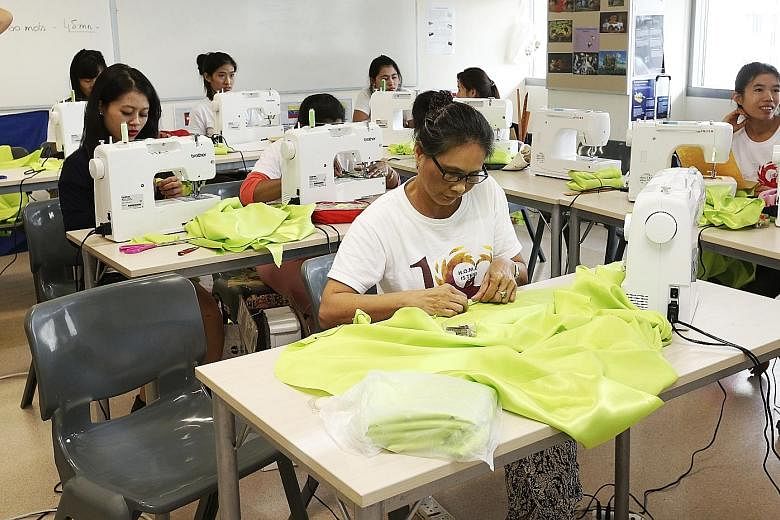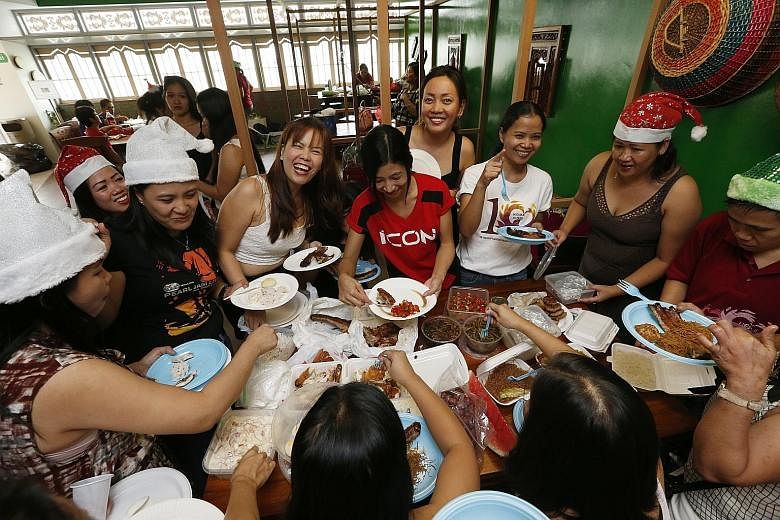The two bedrooms on the third floor of the shophouse are barely larger than four five-room Housing Board flats, yet about 70 foreigners live there. They sleep on double-decker beds laid out side by side along the walls and in the middle of the rooms.
On the second floor, tables and chairs line a communal dining hall and kitchen. Those who walk past the ground floor of the three-storey shophouse in the eastern part of Singapore will have no clue that so many foreigners live behind the plain white doors.
The shophouse may look like an illegal foreign workers' dormitory, but it is far from it. It is Singapore's largest shelter for maids in distress, run by the Humanitarian Organisation for Migration Economics (Home). "This was how we started, helping domestic workers in distress," says Home executive director Sheena Kanwar when she took Insight to visit the shelter last week.
She adds: "It costs us more than $350,000 a year to run the shelter."
Home was founded in 2004 by former human resources and employment agency manager Bridget Tan. Then 56, she used $60,000 from her retirement savings to set it up.
She was then a volunteer at the Archdiocesan Commission for the Pastoral Care of Migrants & Itinerant People (ACMI), which is a ministry under the Roman Catholic Archbishop of Singapore. She decided to break away from ACMI to get more leeway in what she wants to do. "I had to get the bishop's approval for everything in ACMI," she says.
-
HOME
Founded in 2004 by Ms Bridget Tan. The charity, with six staff members, relies on donations and 300 volunteers. Its main focus is helping maids and foreign workers in low-wage sectors such as construction, marine and manufacturing. It has a hotline (1800-7977-977) and help centres in Lucky Plaza, Peninsula Plaza and Grandlink Square, as well as a shelter for maids at an undisclosed place.
She recalls the difficulties Home faced in getting donations and recognition from the Government and the public in the early days. "We had no money. The Ministry of Manpower (MOM) had no idea what Home was about. I had to explain to MOM that Home is speaking up for migrant workers," she says.
She served as Home's president for eight years without pay.
Home's profile soared in 2011 when the US State Department recognised its work in speaking up for victims of human trafficking and gave Ms Tan the Hero Acting to End Modern Slavery Award. She was invited to Washington where she received the award from then Secretary of State Hillary Clinton.
With its higher profile, Home attracted donations and its work expanded. Besides running a hotline and shelter, it saw its Sunday vocational skills training classes for maids grow.
It had been holding ad-hoc English and computer classes for maids since 2004, but it now has a formal school - the Home Academy - that trains about 1,500 maids a year in skills such as English, computer, caregiving, dressmaking, cooking, baking and even martial arts. "Cooking and caregiving are the most popular classes," says academy training administrator Sisi Sukiato. The classes are held on the United World College of South East Asia premises.
Ms Hla Thien May, a maid from Myanmar who was learning dressmaking, says the class helped her to pick up a useful skill. "It is useful when I go home (in future)," says the 32-year-old, who has been working in Singapore for eight years.
Ms Kanwar notes that there is a misperception that Home serves only maids. "Each year, we get about 1,000 calls to the hotline from domestic workers and an equal number from male migrant workers."
Mr Jolovan Wham, who was Home's executive director for eight years and is now its consultant, says that male migrant workers face problems such as salary and employment-related disputes as well as poor working conditions.
He cited a court case last month in which a company boss was hauled to court by the MOM and fined $60,000 for collecting kickbacks from foreign workers.
"It was our case. The workers came to us in December last year, we taught them how to collect evidence and helped them report (the crime) to the MOM," says Mr Wham.
But two months ago, Home shut its centre in Geylang, which had been set up to help male migrant construction workers. "The $4,000 monthly rent was too high and we couldn't afford it," says Ms Kanwar.
Home had a setback in February 2014, when Ms Tan had a stroke. She was hospitalised for four months here before she moved to Batam to recuperate. Donations to Home plunged. Its annual cash donations fell from $1.115 million in March 2014 to $748,157 in March this year.
Ms Tan still lives in Batam, but she returns to Singapore every two months and keeps in touch with Home via e-mail and Skype. She leaves the day-to-day running of Home to Ms Kanwar, who joined Home in July. Ms Kanwar says she is working hard to meet donors and explain to them what Home does and stands for. "We speak up for migrant workers. That is our cause."



